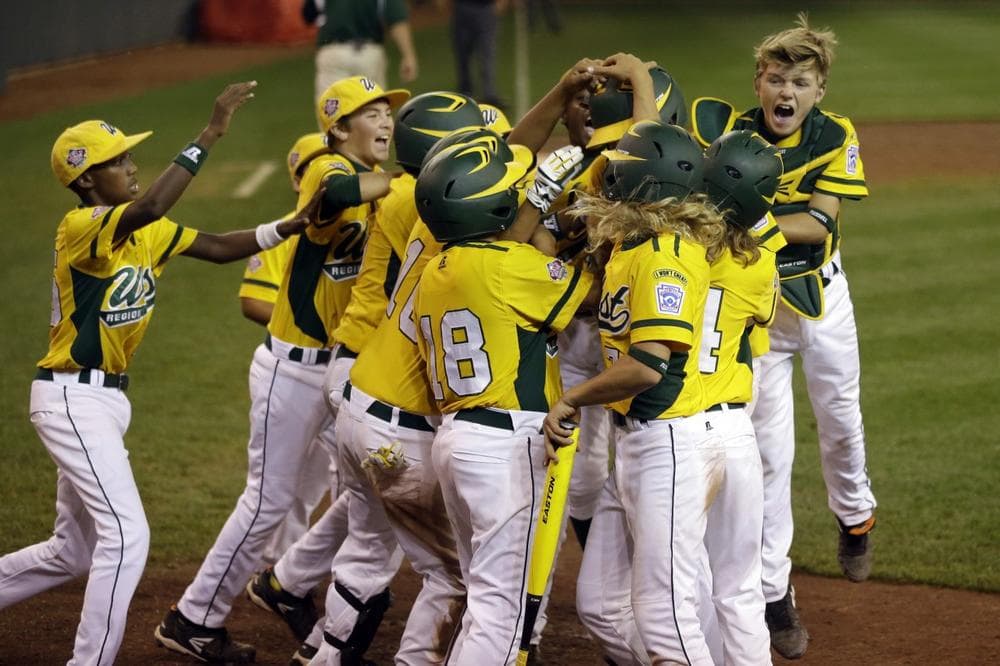Advertisement
Interview
Wetzel: Little League Stars Should Be Paid

The 2013 Little League World Series Champions will be crowned this weekend in Williamsport, Penn. For those who consider Little Leaguers to be the guardians of amateurism, Yahoo! Sports National Columnist Dan Wetzel has a message: pay the players. Wetzel joined Karen Given to explain why he wishes to lay waste to one of sports' last bastions of virtue.
KG: Why pay Little Leaguers?
DW: Well, the Little League World Series is what I would pay. I would not pay the average kid that’s just playing baseball down the street. The Little League World Series is a major event. It brings in about $11 million in revenue. Thirty-two games of the World Series are on television. ESPN’s paying $4 million a year for this thing. Little League Inc., the non-profit that runs this event turns a nearly $3 million a year profit. There are almost two dozen major corporate sponsors. This is already a big business. This is already a professional event. The only people who aren’t getting anything are the actual players.
Now my argument would not be to pay the players, per se, but to provide some kind of a prize, a scholarship, a reward, where every time you play on [ESPN], which is owned by Disney Inc. and pays all of its kid actors and singers in its vast empire, that the kids receive $750 or $1,000 for every appearance on television into a college scholarship fund. The major, major corporations do not look at the Little League World Series as the innocence of youth. They look at it as, "We can use the innocence of youth to sell our product."
KG: You draw an analogy between Little Leaguers, whom you see as entertainers and Disney child actors who are paid for entertaining people. But there’s a big difference between a shortstop and Hannah Montana, isn’t there?
DW: Not if you’re in the Disney, Inc. executive suites. ... They are showing hours and hours of Little League games just the same way that the Hannah Montana-type shows that are now on the Disney Channel run all day on that channel. Forget how the consumer views it. To the executive, this is nothing but content on our TV network. It’s the same thing. ESPN is paying to show this game. They’re taking the wholesome family entertainment, the raw emotion, the cute kids, the whole thing, and they’re putting it on display, and then they’re selling advertising around it. So from the perspective of Disney Inc., no. It’s exactly the same thing.
KG: I hate to bring this up, but lives of Disney actors often take turns for the worse after they become rich and famous. Why would you want to subject Little Leaguers to that?
DW: I don’t think giving a bump to a 12-year-olds college scholarship fund is quite the same as turning Miley Cyrus loose in the streets of Hollywood. However, I’m a believer in letting people live their life and not all the kids have it bad, and I really think it’s a big difference. Look this isn’t asking for a lot. It’s a symbolic thing. Everybody’s getting paid except for these guys.
You could sit there and say, “Look, these kids are dying to play in this thing. They’re eager to play for free.”Well, there’s millions of boy and girl actors and actresses that would love to be on the Disney Channel for free. But somebody along the way came up with the value of the child actor, whether it’s a Miley Cyrus or Skai Jackson or whoever the ones that are on now, and said, “Hey, this kid’s worth this.” And that’s all we’re saying here: these kids are worth something. Some money into a college scholarship fund isn’t that big of a deal.
This segment aired on August 24, 2013.